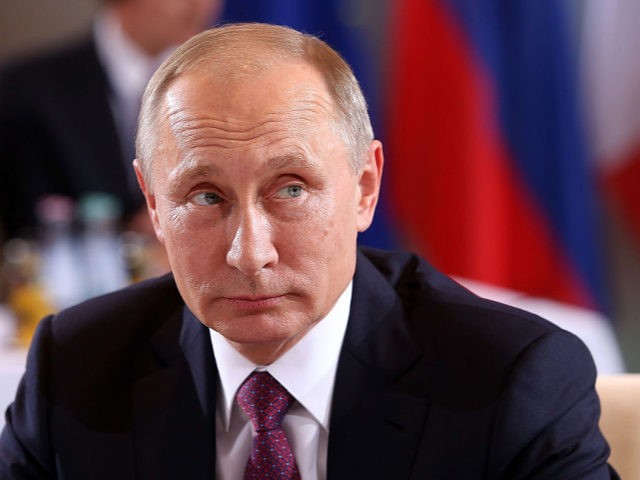Russian President Vladimir Putin urged American counterpart Joe Biden to “stay healthy!” after reporters asked him Thursday to respond to Biden’s comments calling Putin a “killer.”
Biden made the remark in an interview with ABC News published Wednesday.
“He will pay a price,” Biden said of Putin in response to a question about reports of potential attempts by the Russian state to meddle in American politics. “We had a long talk, he and I, when we — I know him relatively well. And the conversation started off, I said, ‘I know you and you know me. If I establish this occurred, then be prepared.'”
Interviewer and former Democrat Party operative George Stephanopoulos asked Biden, “So you know Vladimir Putin. You think he’s a killer?”
Biden responded, “Mmm hmm, I do.”
Biden did not elaborate on any “price” he would make the Russian autocrat “pay.”
Putin responded to the interview the next day.
“As far as statements by my U.S. counterpart are concerned. What would I say to him in response? I would tell him: ‘Stay healthy!’ I wish him good health,” Putin said, according to Russian news agency TASS, which added that Putin insisted there was “not a hint of irony” in his well-wishing.
The Russian government in general reacted much more abrasively to the remarks.
“I would refrain from giving a wordy comment on that,” Putin’s presidential spokesman, Dmitry Peskov, told reporters Thursday during his regular briefing. “I will say one thing: these are very bad remarks on the part of the U.S. president.”
Peskov added that “nothing like that has ever happened before,” referring to Biden’s comments, and similarly described the bilateral relationship between America and Russia as “very bad,” without elaborating.
Moscow recalled its ambassador to the United States and several other diplomats in light of the remarks, though in announcing the move, Foreign Ministry spokeswoman Maria Zakharova did not specify why the envoys returned home. Zakharova, like Peskov, stated only that the relationship between the two countries was in a “difficult state” and at a “dead end,” blaming the United States exclusively for this situation.
Biden’s rhetoric on Russia has not yet yielded any significant policy hindrances for Putin’s regime. As ABC News noted in its summary of the Stephanopoulos interview, Biden’s vow that Putin would “pay” for international crimes was not accompanied by any specific action. Biden’s most significant policy move with Russia was to agree to a five-year extension of the New START arms control treaty, which Moscow was eagerly urging. The Putin regime had asked the prior administration of Donald Trump for a one-year extension that Trump rejected on the grounds the treaty was antiquated and that, without including China, it did little to prevent arms proliferation. Biden added four years to the Russian request and approved it almost immediately after taking office.
The concession to Putin reportedly occurred during Biden’s first phone call with the Russian leader, the “long talk” Biden alluded to in his talk with Stephanopoulos. No reports have indicated Moscow conceded anything to Washington in exchange for the deal.
Stephanopoulos’s reference to Putin as a “killer” referred to several high-profile incidents of opponents to the Putin regime suffering unexplained or mysterious illnesses later identified as poisonings. Some of those poisonings were the product of a chemical weapon known as “Novichok,” used almost exclusively by the Russian government.
The most recent example of such an attempted assassination is the case of Russian dissident Alexei Navalny, who fell ill and was forced into a medically mandated coma in August while on a visit to Siberia. Navalny’s team flew him to Germany, where doctors found “unequivocal proof” of the use of Novichok to kill him. Navalny himself, following his recovery, claimed that he convinced a Russian intelligence agent to confess to an assassination plot against him.
The Russian government denied poisoning Navalny and immediately arrested him upon his return to Russia. He remains in a penal colony at press time.
Medical professionals also identified Novichok as the agent behind the 2018 poisoning of foreign Russian official Sergei Skripal and daughter Yulia, which reportedly occurred in the United Kingdom. The incident, if proven to have been Putin’s doing, would be a case of the use of chemical weapons on foreign soil and, some observers asserted, an act of war. The elder Skripal served as a double agent for both Moscow and London. The Putin regime blamed unspecified “Western” actors for the poisoning.
The Russian government is also believed to have been behind the poisoning of yet another political opponent, former Ukrainian President Viktor Yushchenko, while he campaigned against pro-Russian candidate Viktor Yanukovych in 2004. Yushchenko was reportedly poisoned by dioxin, disfiguring his face and causing significant pain and swelling. Yushchenko survived the attack, won the presidential election, and blamed Putin for trying to kill him.
Unlike Yushchenko, former Russian spy Alexander Litvinenko did not survive severe radiation poisoning after falling ill in 2006. Doctors found the cause of Litvinenko’s death to be the use of polonium-210, a highly radioactive substance. Investigators traced the substance to tea that he drank during a meeting with an allegedly former Russian government agent.

COMMENTS
Please let us know if you're having issues with commenting.